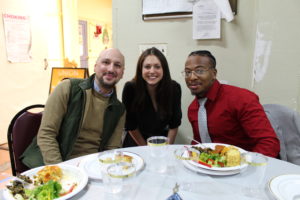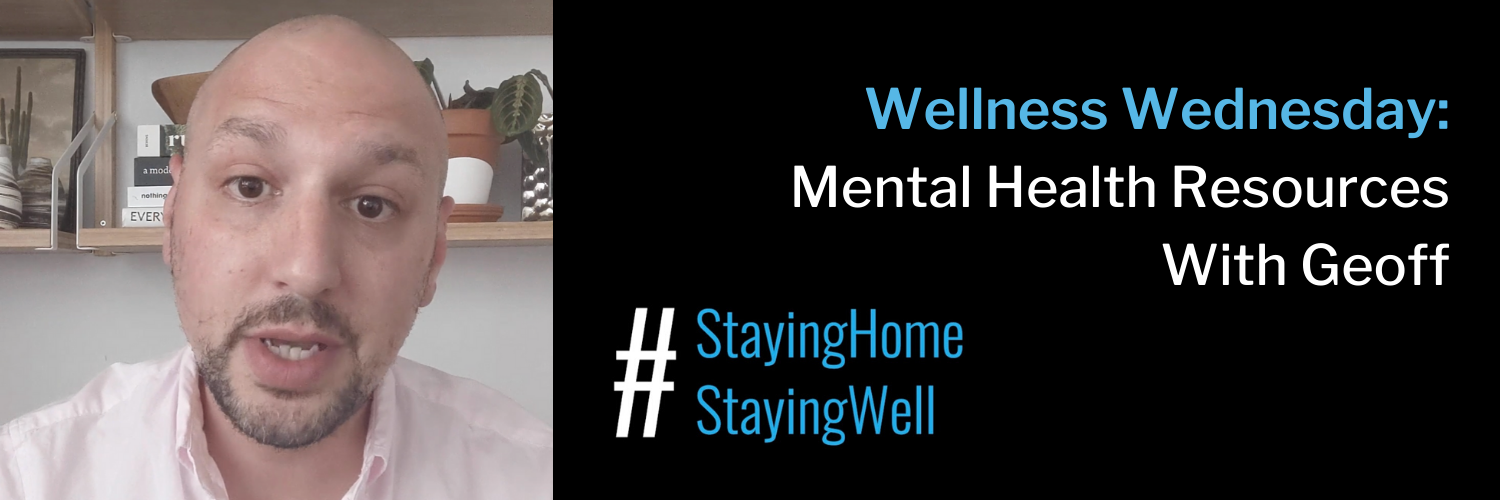
Geoffrey (left) with colleague, Julia (center), and GOSO participant Michael at our annual holiday party.
Geoffrey Golia here — the Chief Administrative and Program Officer at GOSO, and a licensed clinical social worker (LCSW) and mental health professional. This is the first blogpost in our Wellness Wednesday series: Staying Home, Staying Well with GOSO.
Every Wednesday, someone from our community will be sharing information and resources related to wellness and self-care.
At GOSO, emotional well-being is at the foundation of our model and something we stress to both our participants and staff. You may have heard about our Three E’s: Education, Employment, and Emotional Well-being. While we know Employment and Education are important, we understand that without Emotional Well-being, achieving success professionally and personally can be challenging, whether you’re a GOSO participant or not.
During COVID-19 and the subsequent shelter-at-home order, we recognize how challenging it can be to engage in self-care and develop strategies to prioritize your emotional well-being. It’s in that spirit that we’d like to share some practices and resources that may be helpful to you.
Speak to a Professional
At GOSO, we believe in the transformative power of psychotherapy. If you’re having a hard time, reaching out to a mental health provider like a licensed social worker or clinical psychologist can be a way to gain support and discover practices that can help you cope with current challenges. Even now, many psychotherapists are providing remote therapy (like our GOSO social workers) via video chat or telephone. A great resource for this is NYC Well, which you can access via that link or by calling 1-800-NYC-WELL. This service can help you if you need some support right now, or if you’re looking for longer-term care.
Meditation and Mindfulness
Meditation and mindfulness practices can be particularly helpful when we’re dealing with stress and anxiety. Whether it’s a breathing exercise, progressive muscle relaxation, or guided imagery, even a few minutes a day can have a positive impact on one’s ability to cope and focus. During social distancing, if you have access to a smartphone, there are a number of meditation and mindfulness apps you can choose from, many of which are free. One, which we linked to above, is Headspace, which offers a number of tools and resources. Since anxiety is often forward-looking (we tend to worry about what will happen in the future), grounding ourselves in the present can give us some relief from our worries and allow up to look at them with more thoughtfulness and less fear.
Social Connection during Social Distancing
Connecting with family, friends, and support networks is one of the most important ways we can prioritize both self-care and emotional well-being during this time. Social distancing and sheltering-at-home means we can’t see the people who are most important in our lives. Regretfully, this disconnection can actually cause people to isolate even more, and keep them from staying in touch with their loved ones. While this is a common reaction, we would encourage you to reach out to your loved ones via video chat, telephone, or text to check in, seek support, and maintain those important social ties that we’re all so eager to resume once we’re able.
Here are some other self-care tips that may be helpful during this time:
- Set a routine and try to stick to it.
- Do your best to get a good night’s sleep.
- Exercise or go for a walk (while also practicing recommended social distancing and wearing a mask).
- Find safe ways to help your neighbors or community.
- Read a new or favorite book.
- Limit your consumption of the news.
We recognize that these are difficult and unprecedented times, and while we know we will as a community will get through this, we wanted to share these helpful tools as we continue to stay home to flatten the curve. From the entire GOSO and SAVE family, please be well!

